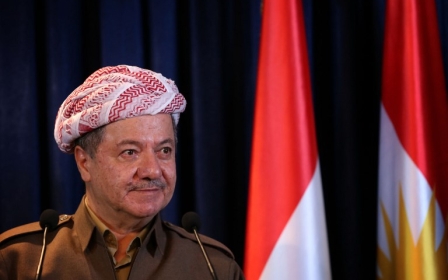The Kurdish referendum threatens to explode the region's struggle over nationalism

In one of his more provocative appearances, Devlet Bahceli, chairman of the Nationalist Movement Party (MHP) in Turkey, said recently that the Kurdish Regional Government's referendum plans might be reason enough for Turkey to declare war on the autonomous region.
Given the gravity of the situation, it's not surprising that Bahceli's comments - as well as the MHP's stance on the referendum - have spurred numerous reactions, both inside and outside of Turkey. It's not worth going into great detail about these reactions.
What matters is that the Turkish prime minister, Binali Yildirim, quickly realised how dangerous his remarks were. He responded, stressing that Turkey was not even contemplating hostile action against Erbil and asked Bahceli to calm down.
They all understand that, should the referendum move ahead, it would constitute a step forward for Kurdistan's independence from Iraq, based on the sense of all of the parties involved that the outcome would most likely be a majority vote for self-determination.
Massoud Barzani, the president of the KRG, does not rule out the likelihood of such an outcome. But at the same time, he says that a majority vote in favour of self-determination wouldn't mean a direct separation from Iraq. The region, he argues, currently enjoys extensive powers that exceed those enjoyed by autonomous administrations in other countries, but still falls short of independence.
Whatever reason Barzani is pushing for the referendum, Kurdistan's legal independence poses problems of varying degrees for Iraq and for neighbouring countries where Kurds live
Despite the financial links that exist between Erbil and Baghdad, which continue to be a source of dispute, Iraqi Kurdistan enjoys full power in the realms of education, security, military and taxation, and even in the field of diplomatic representation abroad.
In other words, the region appears to be largely independent compared, for example, to any of Russia's autonomous republics. It could be argued that the referendum isn't necessary and that, at a time when his presidency suffers from a lack of constitutional legitimacy and when Kurdish foes surround him on all sides, Barzani’s push for the vote has more to do with personal matters than anything else.
Whatever the case, Kurdistan's legal independence poses problems of varying degrees for Iraq and for neighbouring countries where Kurds live.
Repercussions in all directions
Kurdistan's official separation would be very bad news for Iraq, not just because of the existence of disputed territories between Baghdad and Erbil, but also because such a separation might encourage other separatist trends at a time when Iraqi nationalism is going through its worst moment ever.
Turkey, which has the largest proportion of Kurds compared to the other neighbouring countries, and has faced a bloody confrontation with Kurdish separatists since the 1980s, is fearful that the independence of Iraqi Kurdistan might constitute a historic precedent that would throw all post World War I borders into question.
And while Iran tried over the past few years to use the Kurdish card in both Turkey and Iraq, the return of Kurdish nationalist groups in Iran to armed struggle has put the Kurdish question back to the top of the list of concerns for Tehran and its foes alike.
Add the fragmentation in Syria and the endeavour of Kurds there to establish their own entity in northern Syria to the KRG's referendum and the potential regional repercussions are significant.
The conflict to come
With the considerable overlap of Arab, Turkman and Kurdish groups in northern Iraq and northern Syria, there is no doubt that separatist endeavours in Iraq and Syria would generate bloody conflicts that could last for decades and open the region up to unlimited international interventions.
In addition, with longstanding Kurdish divisions that run deep, it is likely that inter-Kurdish disputes would follow, similar, to a large extent, to what South Sudan has been suffering since its independence.
The separatist endeavours in Iraq and Syria would generate bloody conflicts that could last for decades and open the region up to unlimited international interventions
This is all well known to those who are versed in the region’s affairs. Yet what is rarely mentioned is that the Kurdish nationalist movement in Iraq is rooted in the beginnings of the post-World War I regional order. The Kurdish problem in Iraq has not only been the most significant reason behind the instability of the modern Iraqi state, but has also been a very costly burden for the state and its people for nearly a century.
Unlike the Kurds of Turkey, where the majority of the Kurds live outside Kurdish majority provinces and it is also difficult to find a separatist Kurdish majority; unlike the Kurds of Syria, where no significant Kurdish majority regions exist; and unlike the Kurds of Iran, where excessive state violence and sectarian divisions have curtailed Kurdish nationalist tendencies, there are three Iraqi provinces where decisive Kurdish majorities exist.
These three provinces have been living in an extended autonomy for at least two decades. The evolution of Iraqi Kurdistan from this autonomy to an independent nationalist entity seems logical, especially if Iraqi Kurds vote in favour of this option. Such a step would not only grant the Kurds their nation state, it will also liberate Iraq from a very heavy burden.
However, if the Kurdish nationalist movement has learned from the repeat tragedies of the recent past (which Kurdish leaders have, by the way, inflicted upon their people just as their enemies did), then it must have become wiser, more rational and humbler. Within a few years, Iraqi Kurdistan could indeed achieve independence after conducting satisfactory negotiations with Baghdad and reassuring neighbouring countries. This can be achieved at a minimum cost if it was confined merely to the three Kurdish majority provinces.
But trying to seize control of Kirkuk and half of the provinces of Diyali, Saladin and Nineveh, and turn Iraqi Kurdistan into an incubator for terrorist organisations, will not lead to independence but to a war with many parties that lasts a very long time.
Another option
But before that happens - or in its place - there should at least be an attempt at a new vision for the region that could address the separatist ambitions, both Kurdish and non-Kurdish, in the four countries where Kurds live and where a plurality of ethnicities and cultures also exist.
The establishment after World War I of Turkey, Iraq, Iran and Syria - whether carried by the will of the people of these states or by virtue of a foreign decision - was an explicit invitation for the birth of the Kurdish nationalist movement and calls for separatism. There is no doubt that the nationalist idea in the region has caused as much foreboding as it has promised revival and prosperity.
Ultimately, one could ask, if the Arabs, the Turks and the Iranians have had the right to establish their own nation states, why should the Kurds be denied that same right?
However, a different conception of the region, one that drives arrogance back and opens borders for the free movement of people, commodities, wealth and ideas, might in and of itself fulfil the national aspirations of all the people of the region and its ethnic and cultural groups.
Only then will the calls for nationalist separation in this or that state become meaningless, unjustifiable or without a future.
- Basheer Nafi is a senior research fellow at the Al Jazeera Centre for Studies.
The views expressed in this article belong to the author and do not necessarily reflect the editorial policy of Middle East Eye.
Photo: A man walks past a car showing on its windshield a poster bearing the image of Iraqi Kurdish leader Masoud Barzani and supporting independence in the upcoming September 2017 referendum, in Erbil (AFP)
This article is available in French on Middle East Eye French edition.
Middle East Eye propose une couverture et une analyse indépendantes et incomparables du Moyen-Orient, de l’Afrique du Nord et d’autres régions du monde. Pour en savoir plus sur la reprise de ce contenu et les frais qui s’appliquent, veuillez remplir ce formulaire [en anglais]. Pour en savoir plus sur MEE, cliquez ici [en anglais].







